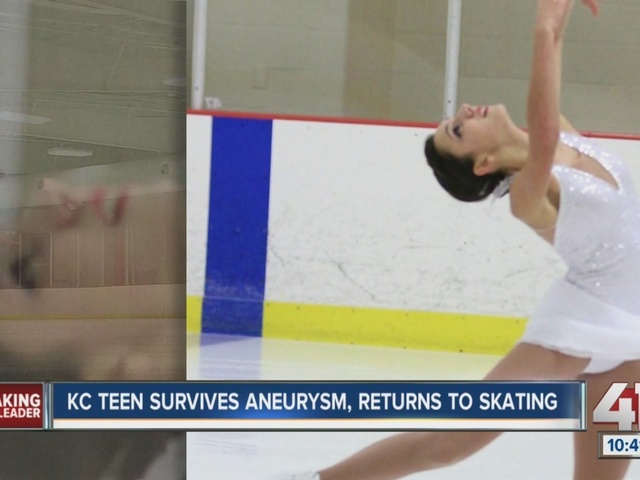It was a normal summer day and Madeline Mudd, a 16-year-old Kansas City girl, was at the ice rink practicing her synchronized skating routine. She'd done it many times, but in an instant, it wasn't normal.
Marcy Mudd, Madeline's mother, was home when she got the call saying her daughter had collapsed, was throwing up and had a horrible headache. Marcy rushed to the rink and got there as the ambulance was leaving with her daughter.
Madeline's father met them at the hospital where doctors assessed her and realized they couldn't help.
Madeline had suffered an aneurysm, causing her brain to bleed severely. The first hospital they went to rushed her to a second, which couldn’t help either. Marcy was then taken by helicopter to the University of Kansas Hospital.
Doctors there were warm and compassionate, but did not give Madeline's parents any false hope.
"The doctors said that one-third of patients don't make it to the hospital. One-third don't make it through surgery. And only a third of the patients survive," Marcy said.
Many who survive are very severely disabled.
"We did not have a lot of good news for the family," Dr.Roukoz Chamoun said. "We were not sure we could save her."
The first thing doctors did was operate to stop the bleeding and prevent it from happening again. They put a clamp on the blood vessel where the aneurysm had occurred.
The operation was successful and the bleeding was stopped. Madeline was in the one-third of patients who survived.
|GALLERY: Madeline Mudd's road to recovery: http://bit.ly/1ecb9kN |
Marcy was extremely thankful, but it was still unclear if Madeline would recover completely and if there was irreversible brain damage.
"There's a difference between surviving and living," Marcy said. "Typically, people who suffer her kind of injury have altered personality."
Meanwhile, there were other issues. Madeline's brain was swelling and nothing was working to help it stop. The doctors said they tried everything but one procedure. If swelling continued, not only would Madeline likely suffer severe disabilities, she would likely die.
In what Marcy recalls one doctor describing as a last-ditch effort to save Madeline's life, Dr. Charmoun and his team removed the two front sections of Madeline's skull and stored them in her abdomen to keep the bones safe. Doctors also installed a balloon pump to treat her heart because Madeline was dangerously close to suffering a stroke due to her weak heart.
Madeline was sent from the hospital to a rehabilitation facility in Nebraska just three weeks after suffering her near-death experience, a timeline much faster than all doctors predicted. With half her skull still removed, she started physical therapy.
Within 22 days, she was up and walking again.
"She was like a newborn baby colt with her little wobbly colt legs just making it down the hallway," Marcy said.
Within four months, with her skull back where it was supposed to be and Madeline got on the ice for the first time since her ordeal.
"She put her helmet on and literally jumped on the ice," Marcy said through tears, "and flew all the way down and took off like she'd never left. I knew then that everything would be okay."
Madeline felt the same way.
"The first day I got to get back on the ice was wonderful. This ice rink is my home, and so being home felt really good. My brain needed that," she said.
Madeline doesn't remember much of her time in the hospital. In fact, she had to be retold daily what happened because she forgot things almost immediately after. The forgetfulness kept the fear away. If she couldn't remember what happened, it couldn't scare her.
"The fear set in later," Madeline remembers now, "because early on I would forget completely what happened and every day I'd forget."
Madeline is almost fully recovered. Her only weakness right now is short-term memory loss. She often forgets what's happened in the past five minutes or earlier in the day. But that is no small challenge, it affects her schooling, her daily chores and her ice skating.
She has people who help her, along with studying, taking notes and watching recordings of classroom lectures and skating routines.
"Her personality is the same. She's loving, kind, compassionate. The essence of who she is all there," her mother said.
Madeline just wants to grow her hair back out since doctors had to shave it for surgery. She also wants to drive again, which is something doctors said she will be able to get back to doing.




